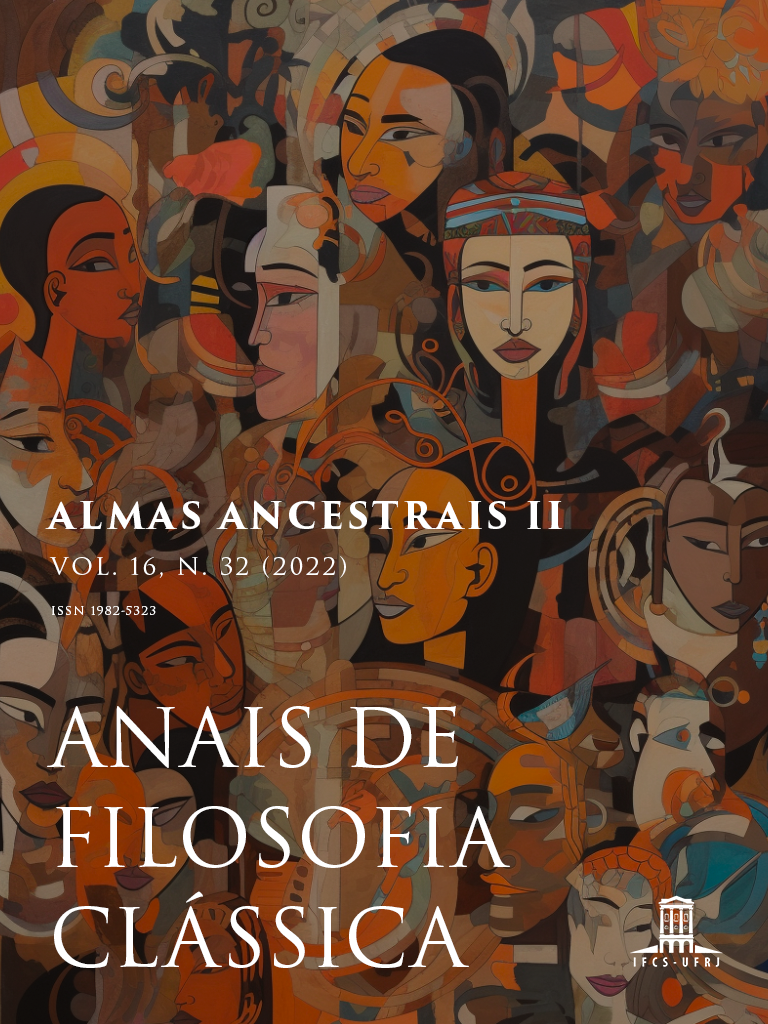Senioridade Oracular
uma reflexão sobre a senioridade do oráculo do Ẹ́ẹ́rìndinlógún sobre o oráculo de Ifá, segundo Oyèrónkẹ́ Oyewùmí
DOI:
https://doi.org/10.47661/afcl.v16i32.60951Keywords:
Ifa, Oracle, Seniority, Eerindinlogun, GenderAbstract
The Ẹ́ẹ́rìndinlógún consists of an oracular system made up of sixteen cowries, being one of the vehicles for interpreting the philosophy of Ọ̀rúnmìlà. However, according to Oyèrónkẹ́ Oyewùmí the lens of gender that blurred the eyes of Western scholars and Yorùbá scholars influenced by the West led to a distortion of the philosophy of Ọ̀rúnmìlà, causing a binary and hierarchical division between the oracular systems that interpret the Odù Ifá. A binary division that elevated the Ifá oracle as masculine and superior and reduced the Ẹ́ẹ́rìndinlógún as feminine and therefore inferior. In this paper, based on Oyewùmí’s thought, we will defend the thesis that the Ẹ́ẹ́rìndinlógún is, in fact, the senior oracle and that the origins of Ifá occurred with Ọ̀ṣun, showing that for Ifá reverence is in seniority and not in gender.
Downloads
References
ABIMBOLA, K. Spirituality and Applied Ethics: An African Perspective. In: West Africa Review, pp. 1-27, 2001.
______, Yoruba Culture: A Philosophical Account. Birmingham: Irokio Academic Publishers, 2006.
ABIMBOLA, W. “Àjàlà and the Choice of Ori” In: Sixteen Great Poems of Ifá. Niamey: UNESCO, 1975, pp. 178-207.
______, “The Bag of Wisdom: Ọ̀ṢUn and the Origins of If áDivination.” In Ọ̀Ṣun across the Waters: A Yor ù b áGoddess in Africa and the Americans, edited by Joseph M. and Mei-Mei Sanford Murphy. Bloomington: Indiana University Press, 2001, 141-154.
______, The Yoruba Concept of Human Personality. In: La Notion de Personne em Afrique Noire. Colloques Internatioaux de Centre National de Recherche Scientifique. Paris: Centre National de Recherche Scientifique. No. 554: 1971, pp. 73-89.
ADEGBINDIN, O. Ifá in Yorùbá Thought System. Durham, North Carolina. Carolina Academic Press, 2014.
______, Ifá Divination, Communication Between Gods and Man in West Africa. Indiana University Press, 1969.
______, Sixteen Cowries: Yorùbá Divination from Africa to the New World. Bloomington: Indiana University Press, 1993.
BENISTE, J. Dicionário Yorubá-Português. Bertrand Brasil. 1° Edição, 2011.
OLUWOLE, S. Socrates and Orunmila: Two Patron Saint of classical Philosophy. 3ª ed. Lagos: Ark Publishers, 2017.
OYEWÙMÍ, O. The Invention of Women: Making an Sense of Western Gender Discourses. London. University of Minnesota Press, 1997.
______, What Gender is Motherhood? Changing Yorùbá Ideals of Power, Procreation And Identity in The Age of Modernity. Palgrave Macmillan, 2016.
PRANDI, R. Mitologia dos Orixás; Ilustrações de Pedro Rafael. 1ªediçã. São Paulo. Companhia das Letras, 2001.
Downloads
Published
Issue
Section
License
Copyright (c) 2024 Anais de Filosofia Clássica

This work is licensed under a Creative Commons Attribution-NonCommercial-ShareAlike 4.0 International License.


